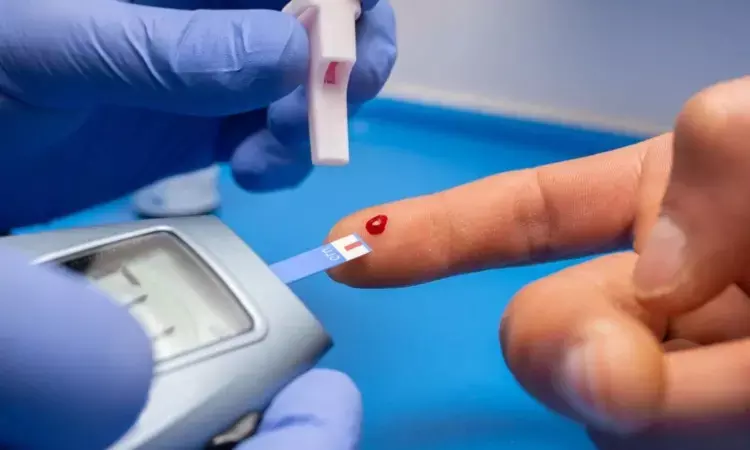- Home
- Medical news & Guidelines
- Anesthesiology
- Cardiology and CTVS
- Critical Care
- Dentistry
- Dermatology
- Diabetes and Endocrinology
- ENT
- Gastroenterology
- Medicine
- Nephrology
- Neurology
- Obstretics-Gynaecology
- Oncology
- Ophthalmology
- Orthopaedics
- Pediatrics-Neonatology
- Psychiatry
- Pulmonology
- Radiology
- Surgery
- Urology
- Laboratory Medicine
- Diet
- Nursing
- Paramedical
- Physiotherapy
- Health news
- Fact Check
- Bone Health Fact Check
- Brain Health Fact Check
- Cancer Related Fact Check
- Child Care Fact Check
- Dental and oral health fact check
- Diabetes and metabolic health fact check
- Diet and Nutrition Fact Check
- Eye and ENT Care Fact Check
- Fitness fact check
- Gut health fact check
- Heart health fact check
- Kidney health fact check
- Medical education fact check
- Men's health fact check
- Respiratory fact check
- Skin and hair care fact check
- Vaccine and Immunization fact check
- Women's health fact check
- AYUSH
- State News
- Andaman and Nicobar Islands
- Andhra Pradesh
- Arunachal Pradesh
- Assam
- Bihar
- Chandigarh
- Chattisgarh
- Dadra and Nagar Haveli
- Daman and Diu
- Delhi
- Goa
- Gujarat
- Haryana
- Himachal Pradesh
- Jammu & Kashmir
- Jharkhand
- Karnataka
- Kerala
- Ladakh
- Lakshadweep
- Madhya Pradesh
- Maharashtra
- Manipur
- Meghalaya
- Mizoram
- Nagaland
- Odisha
- Puducherry
- Punjab
- Rajasthan
- Sikkim
- Tamil Nadu
- Telangana
- Tripura
- Uttar Pradesh
- Uttrakhand
- West Bengal
- Medical Education
- Industry
Reduced Matsuda Index and increased HOMA-IR levels predict progression to type 1 diabetes in AAb+ relatives

Italy: A recent study revealed an increase in progression to stages 2 and 3 of type 1 diabetes with HOMA-IR and decreases with Matsuda index in autoantibody-positive relatives of individuals with type 1 diabetes (T1D).
These findings, published in Diabetologia, suggest that targeting insulin resistance may be an important therapeutic strategy to prevent progression towards the advanced stages of T1D.
"By analysing data from a cohort of 6256 autoantibody+ relatives of individuals with type 1 diabetes, we found that transitioning from Stage 1 to Stage 2 and progression to Stage 3 of T1D was associated with reduced levels of Matsuda Index and increased levels of HOMA-IR, only when adjusted for insulin secretion," Alessandra Petrelli, IRCCS Ospedale San Raffaele, Milan, Italy, and colleagues reported.
Surrogate markers of insulin resistance (IR) have been evaluated in autoantibody-positive relatives of patients with T1D, with varied results. Dr. Petrelli and the team aimed to assess whether HOMA-IR and the Matsuda Index are associated with transitions through stages of type 1 diabetes.
For this purpose, the researchers studied autoantibody (AAb)--positive relatives of patients with type 1 diabetes (n=6256) from the TrialNet Pathway to Prevention. They assessed associations of indicators of insulin resistance (HOMA-IR) and insulin sensitivity (Matsuda Index) with BMI percentile (BMIp), with adjustments for measures of insulinogenic index (IGI), Index60, and insulin secretion.
Cox regression was used to investigate if tertiles of Matsuda Index and HOMA-IR predicted transitions from Not Staged (<2 AAbs) to Stage 1 (≥2 AAbs and normoglycaemia), from Stage 1 to Stage 2 (≥2 AAbs with dysglycaemia), and progression to Stage 3 (diabetes as defined by WHO/ADA criteria).
The key findings of the study were as follows:
· There were strong associations of HOMA-IR (positive) and Matsuda Index (inverse) with baseline age and BMIp.
· After adjustments for Index60, transitioning from Stage 1 to Stage 2 was associated with higher HOMA-IR and lower Matsuda Index (HOMA-IR: HR=1.71; Matsuda Index, HR=0.40), as with progressing from Stages 1 or 2 to Stage 3 (HOMA-IR: HR=1.98; Matsuda Index: HR=0.46).
· Without adjustments, associations of progression to Stage 3 were inverse for HOMA-IR and positive for the Matsuda Index, opposite in directionality with adjustments.
· The findings were similar when the insulinogenic index was used in place of Index60.
"These results highlight the possible importance of targeting IR to delay the progression towards advanced stages of type 1 diabetes," the researchers wrote.
"They thus provide a rationale and a means for investigating therapeutic strategies, such as metformin, diet and/or glucagon-like peptide-1 (GLP-1) agonists, in combination with the targeting of autoimmunity, for preventing the progression to type 1 diabetes," they concluded.
Reference:
Petrelli, A., Cugnata, F., Carnovale, D. et al. HOMA-IR and the Matsuda Index as predictors of progression to type 1 diabetes in autoantibody-positive relatives. Diabetologia 67, 290–300 (2024). https://doi.org/10.1007/s00125-023-06034-y
Dr Kamal Kant Kohli-MBBS, DTCD- a chest specialist with more than 30 years of practice and a flair for writing clinical articles, Dr Kamal Kant Kohli joined Medical Dialogues as a Chief Editor of Medical News. Besides writing articles, as an editor, he proofreads and verifies all the medical content published on Medical Dialogues including those coming from journals, studies,medical conferences,guidelines etc. Email: drkohli@medicaldialogues.in. Contact no. 011-43720751


